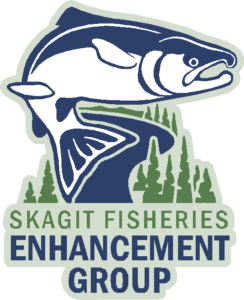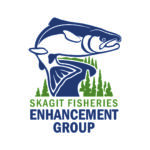In 2022, Skagit Fisheries Enhancement Group worked with a private landowner to remove two culverts that severely limited fish passage in Starbird Creek, a tributary to Fisher Creek within the Skagit Watershed. This project continued the efforts of a 2014 project on Starbird Creek where additional fish passage barriers were removed and replaced with a 60 foot long bridge.

Starbird Creek prior to culvert removal

The Family Forest Fish Passage Program funded the recent project to remove and replace these two side-by-side barrier culverts with an additional bridge, making the space more accessible for fish and people alike. SFEG hired Harkness Heavy Inc. to remove vegetation from the site, staged and laid the bridge pieces, and dug the channel out into its natural shape prior to the installation of the bridge. During construction, SFEG relocated over 800 fish and amphibians to safe conditions, demonstrating the importance this habitat holds within its greater watershed. Species found in the creek include coho, steelhead, cutthroat trout, giant pacific salamanders, and rough skinned newts. Following the completion of the project, a staggering 6.2 miles of crucial habitat was opened for these species. With funding from the Family Forest Fish Passage Program, a program that supports removal of fish passage barriers on privately owned land, this culvert removal and subsequent bridge construction became a win-win situation both for the species found in the creek and for Loren Fuell, the owner of the land, who gained a brand new bridge.


Inlet after bridge installation
Check out a video about the project here!
Are you interested in having fish passage restored on your land?
Inquire with us to find out if your site qualifies for funding: sfeg@skagitfisheries.org
Skagit Fisheries Enhancement Group is a nonprofit organization dedicated to involving our community in restoring salmon populations for future generations. Our work benefits not only salmon but our entire community that values clean water, abundant fish and wildlife, enjoyable recreation opportunities, and a beautiful Skagit Valley. With your help, we envision a future of healthy streams teeming with salmon for our community to enjoy.

















